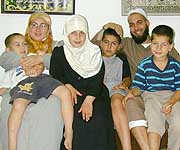NY JEW CONVERTED TO ISLAM
http://www.newsday.com | 04.09.2002 19:34
Cohen is now Yousef Khatab, a Muslim resident of Arab East Jerusalem who finds it impossible to condemn Palestinian suicide bombings.

NY JEW CONVERTED TO ISLAM
Cohen is now Yousef Khatab, a Muslim resident of Arab East Jerusalem who finds it impossible to condemn Palestinian suicide bombings.
"My kids are top in their class," he says, proudly looking at the four Jewish-born children who now speak fluent Arabic and bear Arab names.
People do strange things sometimes - and they do them more often in the Middle East than in many other places. Amid the fear and violence of the Intifada, this land remains holy for billions of people. And when three major religions find sanctity in one place, some people make unorthodox decisions about faith, whether a war is on or not.
Like the evangelical Christians who still say the Messiah is coming to Jerusalem even though he did not show up as expected at the turn of the millennium, Khatab is part of a history of people who come to this region on religious paths that seem remarkable to others.
Khatab's apartment could be the home of any observant Muslim Palestinian. Verses from the Quran in the hand of a skilled calligrapher hang, framed, on the walls. Khatab immediately brings a tray of glasses, soda and water for his uninvited guests. He breaks off an interview to pray.
His wife - once called Luna, now Kamar - walks in with her head covered, like any religious Muslim woman. This the woman who reacted to the news that her husband had found Islam by telling him, "I was born a Jew and I will die a Jew."
Khatab grew up in Flatbush in a Jewish family he describes as not religious. By age 17, he became interested in spirituality, turned naturally to Judaism and soon visited Israel. In Brooklyn, he sold used cars, then gold. He married when he was 23 and about five years ago, moved his family to Israel.
Khatab says now that he did not come primarily for religious or ideological reasons and was already starting to feel uncomfortable with Judaism. "It looked like a nice place," he says. "I saw pictures of palm trees and the Mediterranean."
Soon after he arrived, he said, he began to resent Israel.He felt that the government had shortchanged him, putting his family in substandard accommodations "with an asbestos roof" and pushing them into Hebrew-language school.
Like many religious immigrants, Khatab was drawn to Shas, a religiously oriented, right-wing party. He found a job selling computer software that promoted Judaism.
In the course of his work, he became friends with a Palestinian in Jerusalem's Old City. He was amazed at how generous and kind this rather poor man was to him, a religious Jew. His Palestinian friend gently encouraged him to think about Islam and Israel's treatment of Palestinians.
"The biggest crime was to be born Palestinian, born Arab, born not Jewish," he says now.
One day, Khatab met a Muslim cleric from the United Arab Emirates in an online chat room about Israel, and the two men spent the night exchanging ideas.
Soon Khatab was spending his Sabbath on his sun porch, reading the Quran. In late 2000, as the current round of the Intifada was starting, he converted to Islam. He soon convinced his wife that this was the path for her, too.
Recently, the family found itself the target of Yad Lachem, a group that opposes the conversion of Jews to other faiths. The family had to move and Khatab asks that his new neighborhood be kept secret.
Khatab says he is "perfectly normal." But he also has extremely harsh, sometimes anti-Semitic things to say about Jews. He no longer speaks with his family in Brooklyn. And he says: "We have to have a complete eradication of all the non-Islamic states."
Alongside such absolutism, Khatab is a polite, solicitous host and conversationalist, apparently concerned mainly with bringing up his children in the religion he believes in.
As with many who come to the Holy Land and undergo religious transformations, the true reasons for Khatab's conversion seem impenetrable, mysterious. But he seems beatifically at ease with his choice and how others may react to it. "Whatever God wants," he says, "that's going to happen."
http://www.newsday.com
 Homepage:
http://www.newsday.com/news/printedition/ny-woyusu232835324aug23.story
Homepage:
http://www.newsday.com/news/printedition/ny-woyusu232835324aug23.story
Comments
Display the following 8 comments